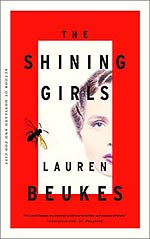
![]() Nymeria
Nymeria
8/22/2015
![]()
Genre blending often produces interesting results, and this fascinating novel is no exception.
The premise: Harper Curtis is one of the many homeless drifters barely surviving in the Depression era, until one night he stumbles on a peculiar house that opens on different time-lines, and he finds both shelter and a terrible purpose there, that of killing the "shining girls", young women of great potential. Already a profoundly unstable character (to say the least), Harper is somehow compelled by the House to contact his victims when they are young and then find them when they are grown up, to end their lives in a most gruesome way. He keeps acting undisturbed through the various eras - from the late '20s to the early '90s - leaving on his victims some tokens from other time periods, with no one questioning these out-of-place items until the only survivor of his attacks, Kirby Mazrachi, launches on a hunt for her assailant and starts collecting evidence, even though many leads seem unconnected.
Besides this fascinating premise, the story is an absorbing read thanks to its structure: each chapter alternates between characters - the Shining Girls - and their killer, with time jumps that are never jarring despite the back-and-forth nature of their placement. There are two connecting threads that tie it all: Harper and his would-be victim Kirby. Harper is an amoral, self-centered creature who hungers for the immediate and unhampered satisfaction of his needs, with the same narrow focus of a child. He is a doubly repulsive character, because in his evilness he seems indifferent both to his acts and the suffering they cause: he makes it all look like work, like something to be done to complete a task, and he somehow comes to believe it's the House that requires this gruesome task from him. It's never explained whether that is true, but in my opinion the relationship is that of a catalyst (the House) finding the perfect vehicle (Harper) to carry on some obscure purpose. Harper feels too much perverse satisfaction in hunting down his victims, in observing them while he savors the outcome, to be the House's mere instrument: when he approaches them for the first time he's nothing short of creepy - some of them, like Kirby, are even able to perceive this in some way - and in some instances he can't refrain from dropping a few hints about his purpose, or to state outright his future intentions, secure in the invulnerability afforded by the time hopping. Once he even warns his prospective victim this way, managing to impress her so profoundly that she wastes her life on drugs, losing the "shine" that made her attractive, so that Harper peevishly regrets that loss, not so much for the missed potential, but for the loss of his own perverse amusement.
Potential is indeed the fuel that makes all these girls shine: they are all young women driven by strong motivations and the energy to carry them through - the social worker battling for women's rights, the war widow working in a naval shipyard and fighting her own war against racial prejudice, the architect dreaming of bettering humanity's living conditions, and many other brilliant individuals. It's easy to see how they would have changed the world or at least the people around them, and it's just as easy to see how such brilliance disturbs Harper, the epitome of the underachiever, the man who goes through his own life without a sense of purpose except that of removing a disturbance in his dreary path. At some point he tells one of them: "You shouldn't shine. You shouldn't make me do this." Because he's of course blameless, the fault is hers alone - it's the kind of deep conviction the news have sadly made us aware of every time we read about women abused by partners, whose main goal seems to be the annihilation of any spark of energy, life and will to fly above the restrictions they feel empowered to impose.
For this very reason, when Harper learn that Kirby survived, he's enraged beyond measure: because she defied his will and dared survive. Kirby Mazrachi is indeed a survivor: the brief flashes about her past that don't concern the bloody assault speak of a difficult childhood that blossomed into strong independence and a streak of stubbornness, the very same qualities that help her survive the grievous wounds inflicted by Harper and the even more difficult aftermath. She is a great blend of strength and frailties, of dogged determination and brittleness, a true heroine who is aware of her wounds and the chinks in her armor, but is ready to fight them to achieve her goal: it's this combination of opposing traits that makes her stand out - shine indeed - and makes her believable. Kirby is an unstoppable force of nature, as reporter Dan Velasquez learns while he mentors her during the young woman's internship at the Chicago Sun-Times: first he tries to discourage her attempts at finding the killer, in the misguided hope of protecting her, even from herself, then he understands that despite what happened in the past Kirby does not need to be saved - and in an interesting twist at the very end of the book she does take the role of savior, both for herself and him. The relationship between the damaged survivor and the jaded reporter, their verbal skirmishes and the growing affection that might or might not turn into something deeper, are some of the best elements of the story, that ends in a perfect, circular way that nonetheless is not devoid of uneasiness, because given the nature of Time we are aware that some events, some terrible occurrences, are still happening somewhere in the past.
And it's a chilling thought...
http://spaceandsorcery.wordpress.com